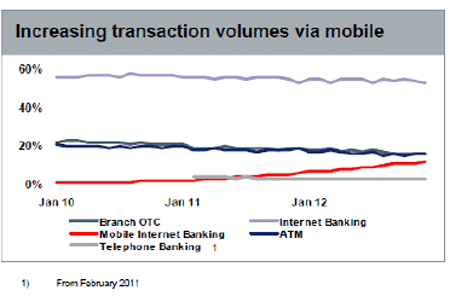By Gareth Vaughan
Rapid customer adoption of digital banking is a revolutionary change for banks enabling them to increasingly cut costs from their branch networks. However, the revolution's not without risks as banks' bigger technology investment bets create ratchet up the risk to their capital bases, analysts at Credit Suisse say.
In a research report on digital banking, Sydney-based Credit Suisse analysts James Ellis, Jarrod Martin and Omkar Joshi note that unlike the take-up of other mass alternative distribution platforms such as telephone banking in the late 1990s, and internet banking in the early 2000s, digital banking is migrating consumer banking activity away from branches, leading to a fall in branch activity levels.
"We see the rapid mainstream take-up of digital banking platforms as something as a revolution for the banking industry," say Ellis, Martin and Joshi.
"In turn this creates medium-term productivity opportunities for the domestic banking industry. The contrast here is that previous phases of new distribution platform roll-out merely resulted in a proliferation in activity levels on to those channels while branch activity levels remained static (thereby supplementing rather than displacing activity)."
"The revolution that we see in this roll-out is that, finally in a generational shift in customer banking usage away from branch banking, banks are now able to reshape their cost bases," the Credit Suisse analysts added.
They see three key aspects to the revolution being; firstly a filter for self-serving statements, secondly a new sustainable source of productivity enhancement, and thirdly bigger technology investment bets creating bigger risks to the capital base.
In terms of the first issue Ellis, Martin and Joshi note it's now common for major banks to highlight the extremely rapid customer take-up of their mobile banking services, as well as to claim leadership and superiority in the selection of their IT vendor sourcing arrangements.
Secondly, they point out banks now see their branch networks as "sources of productivity enhancement," especially through a reduction in branch floor space.
"Increasingly, we see branch networks as a source of productivity enhancement (smaller footprint branches, fewer branch staff, and incrementally fewer branches) with Australian branches estimated to comprise 13-28% of each major bank’s global cost base."
"What has unlocked this productivity opportunity is the reduction in branch activity (perhaps a 5% reduction in volumes per annum) arising from digital banking take-up. We estimate that medium term savings equivalent to 4-8% of current major bank costs bases could be achieved over the medium term through a 30% reduction in Australian branch cost bases," the analysts say.
However, the Credit Suisse team warns that growing technology investments are a risk with something of a spending war emerging, whether related to establishing front-end mobile banking channels, replacing back-end core banking systems, or developing middleware to better link the two.
"As a result of this, the strategic bets in technology platform investment are getting larger and bank managements are seeing the need to make more careful decisions as to the prioritisation of investment spend in a sub-trend revenue growth environment. The risk we see here is not one bank emerging with a sustainable comparative IT advantage over another (historically such instances in the banking industry have proven to be rare) but rather overinvestment leading to impairment charges (albeit acknowledging that bank capital bases are protected to the extent that capitalised software balances are already deducted from Tier 1 capital)."
"Our view is that bank stock investors should view IT like hygiene: something that should only really be focused on when it is not working, and something that you should almost be unconscious of when it is working," the analysts argue.
Meanwhile, Ellis, Martin and Joshi point out that Westpac subsidiary St George Bank, headed by ex-Westpac NZ CEO George Frazis, is trialling teller-less branches as it looks to make greater use of teleconferencing. On the payments front they also point to "the spectre" of competitive threats from PayPal and Google, although they reckon the latter is more interested in chasing advertising revenue than in competing for payments revenue.
The Credit Suisse analysts also list key highlights from a recent annual future of payments conference held by their US colleagues:
■ Mobile banking is witnessing a 76% compound annual growth rate (since 2007) versus online banking at 33% (since 1995);
■ Branches are still regarded as important, but they will evolve in form. New-style branch costs are 40-50% lower on a square foot basis than regular branches. Wells Fargo has piloted a mini branch at 1,000 sq ft (not 4,000 or 10,000 sq ft) as some customers prefer the mobile customer service channel, others the ATM, and others branches;
■ 30-40% of all eCommerce is mobile transactions; Credit card issuer and network revenue streams could be at risk in a shift to a mobile payments environment (although the incumbents hold significant competitive advantages over alternate payment providers); and
■ Everyone is keeping an eye on a certain Cupertino-based company named after a fruit (Apple).

*Chart sourced from Credit Suisse.
This article was first published in our email for paid subscribers. See here for more details and to subscribe.

We welcome your comments below. If you are not already registered, please register to comment
Remember we welcome robust, respectful and insightful debate. We don't welcome abusive or defamatory comments and will de-register those repeatedly making such comments. Our current comment policy is here.